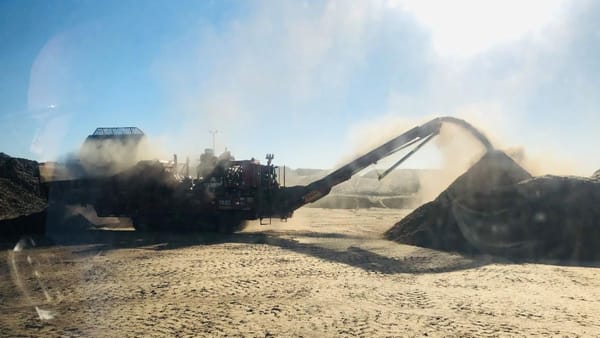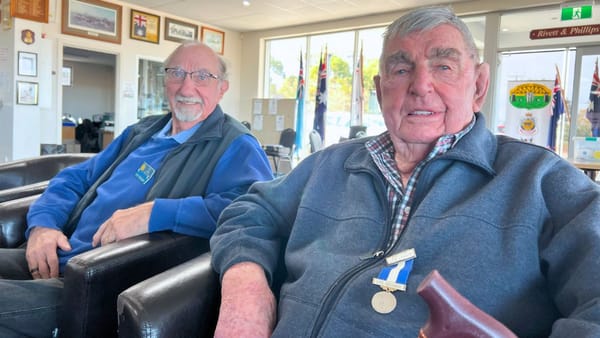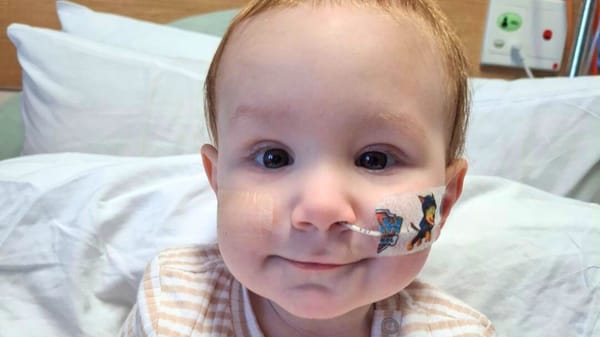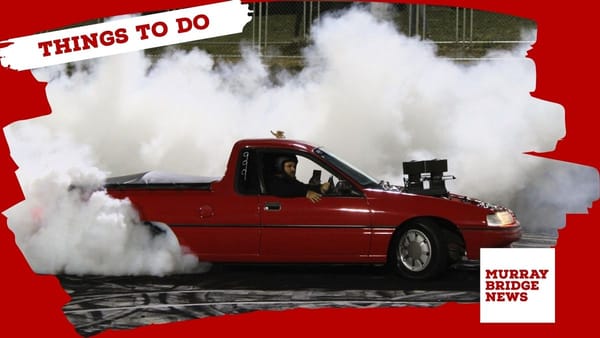Hospital security guards did all they were asked to do and more – then they were let go
The transition to new security arrangements at Murray Bridge’s hospital has highlighted the issue of workforce shortages across regional South Australia.

This story was produced by Murray Bridge News and ABC Riverland as part of a strategic partnership with the Local and Independent News Association.

For 15 years, security guard George Cooper went above and beyond in his service to patients and staff at the Murray Bridge hospital.
He protected nurses from violent threats by patients in the grips of drug addiction, dementia or chronic mental health episodes, and escorted staff to and from their cars at night.
As a “security orderly”, he also helped out on the wards: transporting patients and blood samples, moving equipment, making beds, cleaning, and fetching cups of tea.
Amid a shortage of nursing staff across the country, Mr Cooper’s work was invaluable to the smooth operation of the hospital and its emergency department.
Given recent commitments by South Australia’s government to increase security at regional hospitals, including Murray Bridge’s, he anticipated some extra shifts were on the way.
Instead, in December, he and his colleagues lost their jobs.
“I’d like somebody to stand up and tell (us) why … they’ve brought up an Adelaide crew and sacked local guys,” he said.
“There should be some explanation as to why we got done over.”
Peritas Security operations manager Laury Bais said he had been blindsided by a December 20 email from the local health network, notifying him that Mr Cooper and his other guards would no longer be required after December 22.
Another company would be engaged on a trial basis until mid-January, he was told.
Peritas was not invited to tender for the ongoing work, and Mr Bais said he had heard nothing since.

The change forced security guard Darren Gogel to look for another job after 17 years in the industry.
“You feel a little bit worthless, to a certain degree, worthless and very much angry … about it because performance-wise we’ve always had good feedback from staff, doctors and nurses,” he said.
Another guard, John Woods, said it had been “a bit depressing” to be let go right before Christmas.
He had always been happy to make beds or take patients around the hospital, he said, because the nurses were “understaffed like you wouldn’t believe”.
Stories create community. You can help Murray Bridge News tell our community’s stories.
Patient outcomes are nurses’ union’s top concern
The new security arrangements were the result of a campaign by the Australian Nursing and Midwifery Federation to establish a 24-seven security presence at hospitals around regional South Australia.
State ANMF CEO Elizabeth Dabars said violence and aggression against staff had significantly declined at sites where extra security had been introduced.
In the end, she suggested, that was all that mattered, whether local guards or a larger company provided the service.
“Our concern is always about the best interests for patients and patient outcomes,” she said.
“The only feedback that we have received (from members) is that when those security personnel really become part of the team and work alongside our members, there’s an element of collegiality and partnership that can be seen as quite a positive thing.”

Regional hospitals with 24-seven security now include Murray Bridge, Berri, Port Lincoln, Wallaroo, Port Pirie and Mount Gambier.
Riverland Mallee Coorong Local Health Network CEO Wayne Champion suggested the plan for Murray Bridge and Berri was transition to a new long-term model.
“It is still RMCLHN’s intention to implement an employee-led security model, which will be supported as required by additional contracted security personnel,” he said.
“We currently have an interim arrangement with an outsourced service.”
Asked whether security services at South Australia’s regional hospitals had been subject to an open tender, a spokesperson said SA Health had a state-wide service agreement with national company MSS Security.
However, the spokesperson said, decisions about security at each hospital were made at a local health network level.
It’s ‘common practice’ for guards to help out on wards, LHN CEO says
What about the bigger question with regard to the security guard/orderly roles, then: why did SA Health need security guards to help with cleaning and patient care, anyway?
Mr Cooper said he and his team had been asked to disinfect countertops, make beds, transfer patients and even take male patients to the toilet.
While the guards had not received formal training in those tasks, Mr Gogel said, nursing staff had offered guidance – “it’s not like we did the jobs blindfolded”.
Mr Champion, the local health network CEO, said it was common for security personnel at regional health services to act as concierges or orderlies when they were available to do so.
However: “These services do not include nursing services,” he said in a statement.
“It also does not include emptying bedpans, making beds and assisting with patient care.”
Security personnel were consulted, agreed to perform the extra tasks, and had received appropriate training, he said.
He said the region’s hospitals were well staffed and provided high-quality service to patients.
Mr Cooper, the guard who helped provide that service until just before Christmas, disagreed.
“Look at your local hospitals, especially the country hospitals: how they’re overworked, the local staff,” Mr Cooper said.
“This government was elected on fixing health, and we’re worse off now than ever.
“We’ve got ramping in Murray Bridge: nine beds full and people waiting 24 hours to go to Adelaide.
“It’s got to stop.”
This story was produced by Murray Bridge News and ABC Riverland as part of a strategic partnership with the Local and Independent News Association. For more stories from the Riverland, visit www.abc.net.au/riverland.





